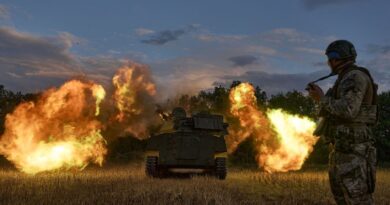Britain leads way in punishing Iran for lies over secret nukes plans | World | News
Iran was demoted to full international pariah state status today as the UN voted for crippling sanctions, in a move triggered by Britain.
The super-tough sanctions, which could set the stage for even military strikes, are a response to Iran’s repeated lying and cheating over its efforts to build a nuclear device.
Sanctions against Iran had been relaxed in a bid to encourage Ayatollah Ali Khamenei to come clean over his nuclear ambitions and drop all efforts to build an atomic bomb.
But, after multiple Iranian efforts to hide its bomb-building activities, Britain with France and Germany, triggered the so-called “snapback” clause in late August. This in turn started a 30-day process which the UN voted on today.
Foreign Secretary Yvette Cooper said: “Alongside my European counterparts, I spoke with Iran’s Foreign Minister Seyed Abbas Araghchi to reiterate concerns over Iran’s nuclear programme.
“The UK remains committed to diplomacy, but Iran has not taken the steps needed to avoid reapplication of sanctions. We need concrete action.”
Now Britain, France and Germany – known as the E3 – will spearhead the push for renewed sanctions unless Tehran meets their demands in a matter of hours.
In France Emmanuel Macron was asked if he supported the snapback. He said: “Yes. I think so because the latest news from the Iranians is not serious.”
Russia, China, Pakistan and Algeria backed Iran and voted to stop the sanctions from being reintroduced, but nine Security Council members voted against sanctions relief. Two countries abstained.
Iranian officials have accused the E3 of abusing the dispute mechanism contained in the 2015 Treaty on the Non-Proliferation of Nuclear Weapons (NPT).
“What Europeans are doing is politically biased and politically motivated … They are wrong on different levels by trying to misuse the mechanism embedded in the Joint Comprehensive Plan of Action (JCPOA),” Deputy Foreign Minister Saeed Khatibzadeh said.
As the news emerged Maryam Rajavi, President-elect of the National Council of Resistance of Iran, said: “This step is belated but extremely urgent and necessary. Anything less than this is granting the regime the opportunity to carry out further executions and massacres in order to more brutally suppress the Iranian people. …Now, by rejecting the proposals of the European Troika, it has been proven that the mullahs’ regime has not renounced its nuclear project and that Europe has no option but the “snapback.
“Truly, if there had not been appeasement a decade ago and if the resolutions had not been suspended, there would have been no need for war.”
The issue will be debated by Sir Keir Starmer next week at the 80th session of the UN General Assembly (UNGA) – but it is expected sanctions will start following Saturday.
Sanctions include:
– An arms embargo
– A ban on uranium enrichment and reprocessing
– A ban on launches and other activities with ballistic missiles capable of delivering nuclear weapons, as well as ballistic missile technology transfer and technical assistance
– A targeted global asset freeze and travel ban on Iranian individuals and entities
– Authorization for countries to inspect Iran Air Cargo and Islamic Republic of Iran Shipping Lines cargoes for banned goods
Perhaps most importantly Resolution 1929, will come into play which allows for military action to prevent Iran’s nuclear program.
The National Council of Resistance of Iran is planning a major protest by thousands of Iranians in New York coinciding with the UN General Assembly. Iranians will reject appeasement, foreign war and will advocate a regime change by the Iranian people and the organized Resistance. On September 6 tens of thousands of Iranians rallied in Brussels and declared their support for Maryam Rajavi’s “Third Option”.
The UN nuclear watchdog – the International Atomic Energy Agency – has said Iran is “dramatically” accelerating enrichment of uranium to up to 60% purity and is on target to achieve the roughly 90% weapons-grade level.
Western countries say there is no need to enrich uranium to such a high level unless you intend to produce nuclear bombs.
The Foreign, Commonwealth & Development Office has been approached for a comment.





